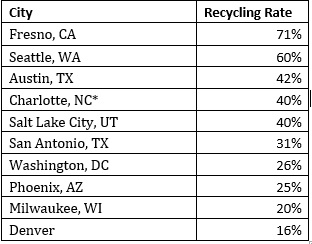Recycling: A Missed Opportunity to Make Denver More Sustainable
Downloads
Denver’s poor recycling rates place Colorado’s capitol city among the most wasteful cities in the nation, according to a report by nonprofits CoPIRG and Eco-Cycle. According to the report, Denver only recycles 18 percent of the waste from single-family homes and small apartments, one of the worst rates in Colorado as well as among peer cities across the country. In addition, many residents in large multi-unit apartment buildings lack access to the most basic component of recycling – the purple recycling bin.
The report found Denver near the bottom of the list for recycling rate compared to cities along the Front Range. Cities including Boulder, Louisville, Longmont, Fort Collins, Golden, and Loveland all have recycling rates that are two to three times higher than Denver’s 18 percent.
The report also compared Denver to peer cities across the country and found a similar pattern – Denver is at the back of the pack. For example: Salt Lake City, Utah; Charlotte, North Carolina; and Austin, Texas, have recycling rates that are twice that of Denver’s rate.
Residential Recycling Rates, Peer Cities with Municipally Run Trash and Recycling Services

The report discussed the negative impacts poor recycling programs have on the community. It means we’re creating landfills, like the Superfund-designated Lowry Landfill, full of toxic soup that will take millions of dollars to maintain. It means Denver misses out on millions of dollars of valuable recycling materials. It means Denver contributes to an inefficient production system that produces unnecessary amounts of energy and creates unnecessary amounts of pollution.
REPORT RECOMMENDATIONS:
- Ensure that all residents have access to recycling– One-third of Denver’s housing stock is made up of large, multi-family complexes, but these properties are not required to provide residents with recycling or composting services. Denver should require all property owners provide adequate and convenient recycling and composting services at all multi-family properties.
- Provide composting service at no additional charge – Roughly half of the waste in residential trash bins is organic—i.e. leaves, grass clippings and food scraps. Denver should provide composting services to single-family homes at no additional charge.
- Provide financial incentives to recycle and compost – Those who waste more, should pay more. Conversely, those who recycle and compost and minimize their trash should be financially rewarded. Denver should undertake a full financial study of its trash rates and create a plan to transition to volume-based pricing by 2020.
- Support business recycling and composting – Businesses produce more than half of the discards in Denver, so any meaningful strategy to improve recycling has to include them. Denver should create a plan to double its business recycling rate by 2020.
- Set a Zero Waste Goal – Denver’s current vision of recycling 34 percent by 2020 would only put Denver on pace to reach the current nationwide average. Denver needs a much more ambitious vision that puts the city on a path towards Zero Waste, which would mean that roughly 90 percent of its waste is reused, recycled, or remanufactured. Denver should replace its solid waste master plan with a Zero Waste plan and formally adopt a Zero Waste goal.
Download the report above.
